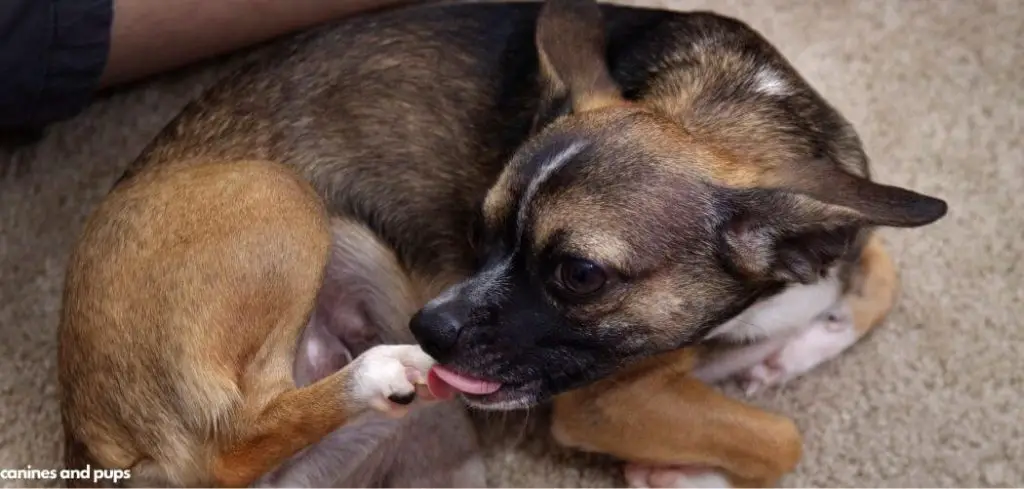It’s concerning to see your dog excessively licking her vulva, especially if the behavior is sudden or persistent. While some grooming is normal, constant licking can indicate a more serious medical condition.
We outline the common reasons why a female dog may excessively lick their vulva, what you can do at home, and when to seek veterinary help.
Dog Excessively Licking Vulva — Why It Happens
Excessive vulva licking in dogs is usually caused by irritation, infection, hormonal changes, or underlying discomfort. Female dogs may lick their vulva due to urinary tract infections, vaginal inflammation, allergies, or even behavioral reasons like stress. In some cases, spayed dogs can also experience vulvar changes that trigger this behavior.
Even if there are no obvious external signs, it’s important to pay attention to the behavior, as it often points to an underlying issue.

Dog Excessively Licking Vulva: Common Causes
Urinary Tract Infection (UTI)
Urinary tract infections are a common reason dogs excessively lick their vulva. The infection causes irritation and burning sensations when urinating, which makes dogs lick frequently to relieve discomfort.
Other signs you may notice include frequent urination, straining to pee, or small accidents in the house. Left untreated, UTIs can spread to the kidneys and cause more serious illness, so prompt veterinary care is important.
Read more: My Dog’s Private Area Is Red (Possible causes explained)
Vaginitis
Vaginitis is inflammation of the vaginal area and can affect both young puppies and older spayed dogs. The irritation often leads to persistent licking of the vulva.
You may see a discharge, redness, or swelling, but in some cases, licking may be the only visible sign. This condition can be caused by bacterial infections, hormonal changes, or anatomical issues.
Allergies
Allergies—whether food-related or environmental—can cause itching around the vulva and genitals. Dogs with pollen, dust, or grass allergies sometimes develop skin irritation in sensitive areas, leading to compulsive licking.
In food allergies, licking may also be accompanied by ear infections, paw chewing, or chronic skin problems. Addressing the allergy often helps reduce the licking behavior significantly.
Spay-Related Changes (Hormonal or Anatomical)
Some spayed dogs develop a condition called recessed vulva or vulvar fold dermatitis, where skin folds around the vulva trap moisture and bacteria. This can make the area itchy or painful, causing constant licking.
Hormonal changes after spaying may also lead to thinning of tissues, making the vulva more prone to irritation. These cases often require veterinary evaluation to prevent recurrent infections or ongoing discomfort.
Urinary Incontinence
In older spayed females, urinary incontinence is a common cause of excessive vulva licking. Small urine leaks irritate the skin and fur around the vulva, prompting the dog to lick frequently.
You may notice wet spots where your dog rests or a persistent urine odor. While not life-threatening, urinary incontinence can significantly affect comfort and requires medical management.
Behavioral Causes
Sometimes, excessive vulva licking is not due to a physical problem but instead stems from stress, anxiety, or boredom. Dogs may develop compulsive behaviors as a form of self-soothing.
If no medical cause is found, and the licking happens mainly in stressful situations, a behavioral explanation may be likely. Left unchecked, this habit can still cause skin irritation or secondary infections.
What to Do If Your Dog Is Excessively Licking Her Vulva
If your dog is licking her vulva excessively, start by gently examining the area. Look for redness, swelling, discharge, or foul odor, which can all point to infection or irritation.
Use a pet-safe wipe to gently clean the area if it looks dirty or moist, and make sure your dog is not exposed to household chemicals or lawn treatments that may cause irritation.
Provide plenty of fresh water and monitor urination closely. If your dog is straining, peeing more often than usual, or having accidents, it could signal a urinary problem.
You can also try redirecting your dog with toys, interactive games, or walks to reduce compulsive licking when no obvious physical cause is present. Keeping the vulvar area dry and clean can help minimize discomfort while you monitor for changes.
For dogs with a recessed vulva, daily hygiene—such as wiping folds and trimming excess fur—can reduce irritation. Special supportive diets or supplements may help dogs prone to urinary issues or allergies, but always check with your veterinarian before making changes.
When to Call or Visit Your Vet
While some cases of vulva licking may be mild and temporary, there are times when veterinary attention is essential.
If your dog’s vulva appears red, swollen, or produces discharge, schedule a vet appointment as soon as possible. Persistent licking accompanied by foul odor, pain, or whining usually means there is an infection.
If your dog is urinating excessively, straining, or having blood in her urine, this may indicate a urinary tract infection or bladder stones—both of which require veterinary treatment.
Sudden onset of licking after spaying or in older female dogs may signal vulvar fold dermatitis, incontinence, or hormonal-related changes, which a vet should evaluate.
If behavioral causes are suspected, your vet may recommend working with a trainer or using calming aids to reduce anxiety-driven licking.
Read more: Dog Excessively Licking Privates (Here’s Why)
Key Takeaway
If your dog is excessively licking her vulva, it’s important not to ignore the behavior. It can be a sign of discomfort, infection, or even a behavioral concern.
At-home care, such as cleaning the area and monitoring for changes, can help temporarily. But if the licking persists or you notice other symptoms like discharge, swelling, or urinary changes, it’s time to call your veterinarian.
Prompt attention ensures your dog stays comfortable, prevents complications, and helps you get to the root cause of the behavior with confidence.
